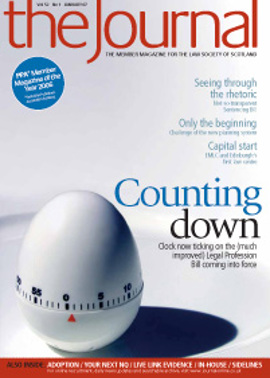Countdown phase

The legal profession in Scotland is into the countdown phase for a sea change in regulation. That will occur with the coming into operation of the Scottish Legal Complaints Commission, probably within the next two years, after the enabling bill cleared its final parliamentary stage shortly before Christmas.
However the new body will operate under quite a different legal regime than seemed likely even in the run-up to the Scottish Parliament’s stage 3 debate on 14 December, as the Executive proposed or agreed to support a series of amendments designed to remove perceived unfairnesses arising from the bill as it previously stood.
Perhaps they intended to show by example how they hope most disputes will in future be settled. In any event MSPs repeatedly affirmed their desire to achieve a consensual approach to the final form of the bill, and while inevitably a series of votes were called on outstanding matters, much more was agreed to or withdrawn as the remaining major points of contention were settled.
Convention-compliant
In particular the doubts over compatibility with the European Convention on Human Rights, highlighted by the Law Society of Scotland right up to the eve of the debate with the backing of the professional opinion of Lord Lester of Herne Hill QC, appear to have been resolved – this through the combination of a requirement on ministers to consult with the Lord President before making appointments to the Commission, and the concession of a limited right of appeal to the Court of Session, with leave of the court.
“We now believe that the bill is ECHR-proof, and that it will receive royal assent some time in January”, Michael Clancy, the Society’s Head of Parliamentary Liaison, told the Council meeting the following day. “There have been improvements right across the board, and the bill is now much improved.”
Team effort
For the Society’s bill team (Ruthven Gemmell, President; John MacKinnon, Vice President; Caroline Flanagan, Past President; Douglas Mill, Chief Executive; Phillip Yelland, Director of Client Relations; Gillian Meighan, Director of Corporate Communications; and Michael Clancy), the outcome is some reward for an immense amount of work since the Legal Profession and Legal Aid (Scotland) Bill first saw the light of day early last year.
It is generally acknowledged within the parliament that the Society’s unremitting efforts to engage with ministers, civil servants and members of all political parties alike over the implications and likely effects of the bill were highly effective. At times it looked as if they might go unrewarded, but through sheer persistence MSPs listened and important progress was made.
“The purpose of the Society throughout has been to ensure that any new system for handling complaints against lawyers is an improvement on the existing process”, Douglas Mill commented as MSPs finally approved the bill. “And, indeed, a number of those who spoke during the parliamentary debate paid tribute to the work of the Society.”
One of the objectives of the bill team was to ensure that they kept the profession and stakeholders informed at every step of the process. The profession took action to make their voices heard, ensuring that their MSPs were aware of the negative consequences of the proposals both for solicitors and their clients. Non-solicitor committee members, business suppliers and clients also contributed greatly to the breadth of the debate.
The next phase
Mill is hopeful that the revised bill, and regulations to follow, will provide the basis for a fair and workable system. “We will examine the amendments in detail, although our hope remains that an improved system, which retains the confidence of solicitors and their clients, will now be established. The hard work on the practicalities starts here and we will continue to work where possible with the Scottish Executive and the SLCC to highlight any areas of concern in order to fulfil our duties towards the public and the legal profession in Scotland.”
And that phase of the work, for the Society and the profession, begins now. To recap, solicitors (and advocates) have two years at most to prepare for the new regime, under which:
- The Scottish Legal Complaints Commission will investigate all complaints of inadequate professional services, including allegations of professional negligence, not settled through conciliation, with power to order compensation of up to £20,000;
- The Law Society of Scotland will continue to investigate and prosecute all matters of alleged professional misconduct, and will have a new power to make a finding of unsatisfactory professional conduct where a solicitor’s actings are regarded as unsatisfactory but falling short of professional misconduct;
- The Commission will be funded entirely by the legal profession, through an annual levy on solicitors with a practising certificate together with a levy per case where a complaint is resolved through or upheld by the Commission – but not now where the solicitor is exonerated;
- The Commission will be appointed by ministers through the public appointments procedures, but subject to consultation with the Lord President, who must also consent to the dismissal of any member;
- The Commission will have the power to deal with complaints from members of the public about the way in which the professional bodies have dealt with a conduct complaint, and of oversight of the operation of the Master Policy and Guarantee Fund.
Educating the profession
“It is really important for firms to look at how they deal with client care issues and to ensure that they have the right client relations partner in place for the new era. Resolving matters before they reach the Commission will be the key”, commented Philip Yelland, Director of the Client Relations Office.
He added: “The client relations team will of course continue to handle both service and conduct complaints until the SLCC starts work, and there is much to be done to ensure a workable system. We will continue to communicate with our members and will have an education programme so that we give members as much support as possible to prepare them for the new regime.”
Clearly much detail has still to emerge, and the Journal will keep readers fully briefed as the picture becomes clearer.
Law from over the border
Meanwhile, for Douglas Mill attention is already switching to the Legal Services Bill for England & Wales, which he fully expects to have unavoidable knock-on effects in Scotland.
“The task which the Society undertook in relation to the Complaints Bill was immense and whilst I think we all deserve a well-earned rest, a new team will be formed in the new year to start looking at the issues coming out of the English Legal Services Bill, in particular in relation to the formation of alternative business structures. In many ways, these may have a more profound effect on Scotland’s collegiate profession and provision of legal services in the high street than the Complaints Commission, and whilst we probably have very little in the way of influence over the Westminster bill, we still need to make the points which we have emphasised up until now, namely, that very little consideration has been given to the regulation of these entities.
“The Society has no root and branch opposition to them. Our position is pragmatic and we have been asking for a number of years now for an adequate regulatory model to ensure that our corporate approach to fidelity, negligence and other issues is not prejudiced by inappropriate control – and this is the issue rather than ownership – of small legal firms.
“I am not sure that the complex licensing model which the bill proposes is the answer. It may be effective for the City of London but it presents dangers for the public and profession in Scotland.”
THE LATE LATE AMENDMENT SHOW
Among the amendments to the bill agreed at stage 3 were:
- In assessing compensation for distress and inconvenience the Commission shall take account of levels of damages awarded by the courts in similar circumstances. Deputy Minister Johann Lamont: “I hope that that will make clear what we have always said: when a services complaint might alternatively have been brought as a court action, compensation will be broadly in line with what a court would have ordered.”
- Appeal from the Commission to the Court of Session will be allowed, with leave of the court, on these grounds: error of law; procedural error; irrational exercise of discretion; or decision not supported by the facts. Similar appeal provisions apply to the mental health tribunals. The Commission would be respondent in the appeal – thus ensuring that the costs are borne by the profession. Johann Lamont: “The restricted right of appeal will not affect the policy aims underlying the creation of the Complaints Commission. The small number of important appeals that might go to the Court of Session by this route will emphasise the Commission’s ultimate accountability to the courts for its decisions.”
- If a professional body fails to comply with a Commission direction, the Commission may petition the Court of Session for an order to comply. Only following such an order might any question of contempt of court arise.
- To increase accountability, the Commission shall publish by 31 March each year the responses it receives to its annual consultation and proposed budget, unless confidentiality is requested.
- To underpin the Commission’s independence from government, the Lord President is to be consulted before the Commission makes or varies any rules of procedure; and ministers must consult him before making any appointments to the Commission. Johann Lamont: “That will help to reinforce the fact that members of the new commission will have to be able to adjudicate in an independent and impartial way. Those judicial qualities will be assessed as part of the appointments process.”
- The Commission will be able to reject a complaint without investigation if it is “totally without merit”, as well as any that are frivolous or vexatious.
- Any direction of the Scottish Solicitors Discipline Tribunal on an appeal relating to an unsatisfactory professional conduct complaint will be enforceable in the same way as an extract registered sheriff court decree.
- Amendments defeated included:
- An attempt to reduce the maximum compensation competent to the Commission from £20,000 to £15,000;
- An attempt to make the Commission conduct a review and report on the workability of the different handling of conduct and service complaints after two years.
In this issue
- The Isle of Man
- Contractual handcuffs: enhanced redundancy rights
- Strength of purpose
- Cleared for take-off
- Countdown phase
- A quiet revolution
- Acting your age
- Adopting new solutions
- Clear as mud?
- Majoring in minorities
- Believe in the future
- Appreciation: Dr J Stuart Fair
- Grow your own assistant
- On the radar
- Status of the expert's report
- Rewarding experience
- Restructuring - in hindsight
- Court rules catch up with live link TV
- Scottish Solicitors' Discipline Tribunal
- Website reviews
- Book reviews
- Top notch training
- A clearer way to deal
- Not the best option
- Letting in the disabled
- Single survey: have your say






